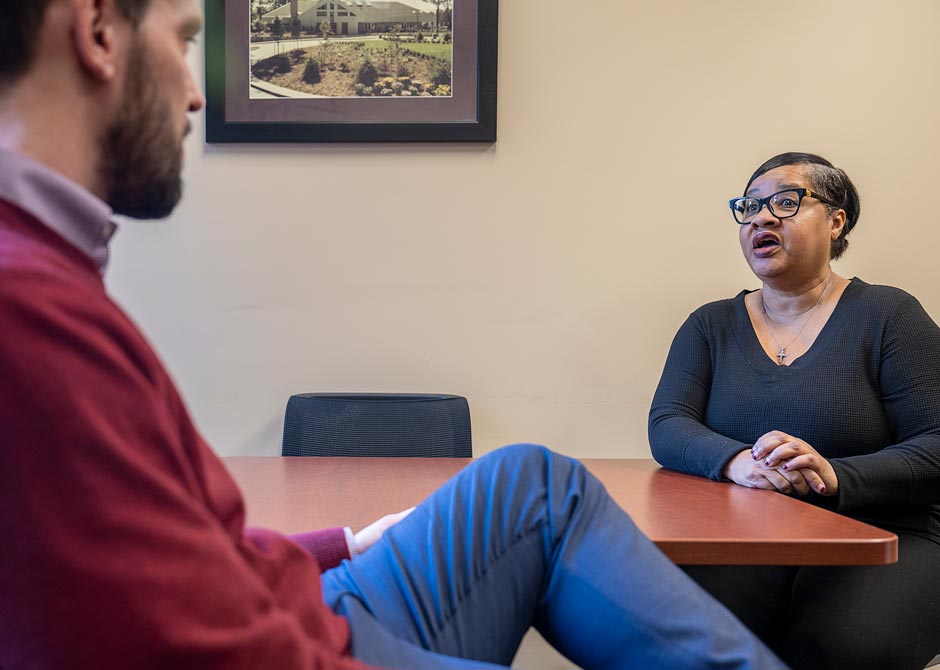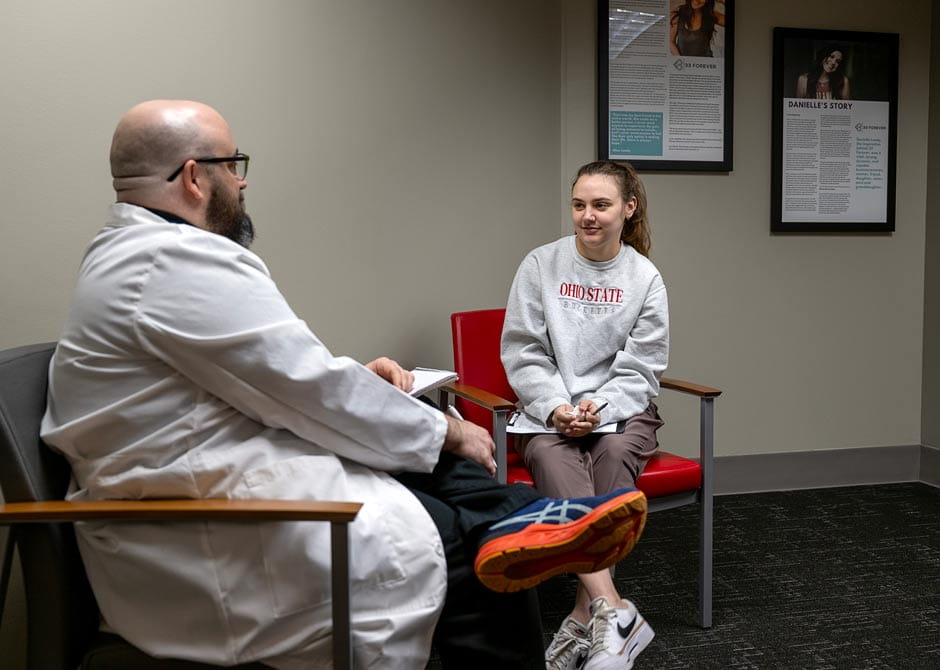 Mental health conditions, such as depression, schizophrenia or substance use disorder, can become overwhelming. There are times when symptoms become so distracting that it’s difficult to engage in activities of daily living, such as work and spending time with friends or family. Sometimes these symptoms become so severe that people can have thoughts of harming themselves or others.
Mental health conditions, such as depression, schizophrenia or substance use disorder, can become overwhelming. There are times when symptoms become so distracting that it’s difficult to engage in activities of daily living, such as work and spending time with friends or family. Sometimes these symptoms become so severe that people can have thoughts of harming themselves or others.
Under these circumstances, individuals may benefit from inpatient mental health care, which provides round-the-clock care that focuses on reducing symptoms and ensuring your safety as you work toward stability. At The Ohio State University Wexner Medical Center in Columbus, Ohio, we have a well-established inpatient mental health care program at Ohio State Harding Hospital. Inpatient care at Harding focuses on evidence-based practices and treatments to keep you secure and help you transition back to independent living as quickly as possible.
When treated here, you’ll receive care from an entire mental and behavioral treatment team in a supportive and healing environment. Our experts understand that treating severe mental health issues requires personalized attention and a plan unique to each individual walking through our doors.
If you have thoughts of harming yourself or someone else, or are in emotional distress, please call or text 9-8-8.
What is inpatient mental health treatment
Inpatient mental health care requires you to spend the night in the hospital. Stays can range from one night to a week or more, depending on what is best for the patient. Inpatient care is typically reserved for people in crisis who require more care than in an outpatient setting or doctor’s office.
The 84-bed adult inpatient program at Harding Hospital provides emergency stabilization, diagnosis and the initial stages of treatment. Stabilization is particularly important if there is a risk for personal harm, including suicide risk or injury to self or others. While stabilization is imperative, the goal of inpatient care is to discharge you into the lowest acuity of care with a treatment plan that will help support you as you get back to independent living. From day one, we begin planning your safe and sustainable discharge, often to partial hospitalization or outpatient care.
Types of treatment you might receive in inpatient care include:
- Medications
- Psychotherapy (individual or group)
- Interventional psychiatry procedures, such as electroconvulsive therapy (ECT) or vagus nerve stimulation (VNS)
- Skill-based interventions
- Round-the-clock nursing care
Inpatient psychiatric care and residential mental health care are not the same thing. Residential treatment doesn’t provide 24-hour care; however, some people aren’t ready to return to independent living and need a safe and supportive place to stay. Currently, the Ohio State Wexner Medical Center has residential care only for people with a substance use disorder. Our 15-bed unit opened in March 2024.
 Who is inpatient mental health care for?
Who is inpatient mental health care for?
Inpatient care is for anyone with a mental health condition who is at risk of harming themselves or others or can’t function in daily living.
Conditions treated in inpatient mental health care include:
- Severe mood disorder, including bipolar disorder and depression
- Psychosis or schizophrenia
- Anxiety disorder
- Post-traumatic stress disorder (PTSD)
- Substance use disorder (detoxification)
- Suicide risk
How do I know if I need inpatient mental health care?
Not everyone with a mental health condition will need inpatient services. You may need treatment in an inpatient mental health facility if:
- You’re experiencing thoughts of suicide.
- You’re having intrusive thoughts of harming yourself or others.
- You’re being violent or extremely agitated.
- You’re experiencing intense fear, paranoia or hopelessness.
- You’re disoriented and out of touch with reality.
- You struggle to keep up with the activities of daily living.
- You need to detox from drugs or alcohol.
What to expect in inpatient mental health care
Admissions to Ohio State Harding Hospital inpatient services are handled by Psychiatric Emergency Services (PES), a team of mental health specialists embedded in our emergency department. This service is available 24 hours a day, seven days a week.
People who are referred to inpatient care typically come from the emergency department, but medical units, outpatient clinics, physician offices and community mental health centers can also refer people. Once someone is cleared by the emergency room medical clinicians, the PES staff will provide a comprehensive psychiatric exam that focuses on the crisis and whether the person is safe. The clinician will collaborate with Harding Hospital psychiatrists to determine the appropriate level of care.
If admitted for inpatient services, your multidisciplinary team of clinicians will put together a treatment plan, which could include medications, individual and group psychotherapy or other methods specific to your psychiatric needs. Typically, people stay in inpatient treatment for five to seven days, but this can vary.
While in inpatient care, you and your family can expect:
- An expert staff specially trained in inpatient psychiatric care
- A comfortable room in which you can consult privately with your providers and feel safe
- Secure inpatient floors to keep you and visitors safe
- An on-site locker where people can store their belongings
- Common areas to gather and participate in recreational and treatment programs
- Meals provided by nutritional services
- A galley where snacks can be found
- Visiting hours daily (8 a.m.-8 p.m. Monday-Friday, 11 a.m.-8 p.m. Saturdays and Sundays)
- A series of meetings with our hospital social workers and discharge planning team to facilitate a smooth transition out of the hospital and into the next level of care (partial hospitalization, outpatient, for example).
Why choose Ohio State for inpatient psychiatric treatment
The Ohio State Wexner Medical Center is a leader in providing mental health care to those in central Ohio and beyond, including to those in crisis or who need acute care.
Here are some key differentiators in our inpatient program:
We have capacity
Ohio State Harding Hospital has one of the largest inpatient mental health units in Ohio with 84 beds. Harding Hospital was recently renovated, and we’re constantly making changes to better serve you. We also recently opened a 15-bed residential treatment unit for people with a substance use disorder in Ohio State Talbot Hall.
We focus on safety
Sending a loved one to inpatient mental health care can be overwhelming, but we want to assure you that making sure your family member is safe and well cared for is our top priority. We’re consistently looking at risk assessment measures and best practices for maintaining this security.
We offer a full continuum of mental health care
When your condition has stabilized, we can transition you directly and easily into one of our other mental health care options, if that’s the best next step for you. Sometimes you might be better served in a community mental health setting, and we can coordinate referrals to those agencies. No matter what comes after your inpatient stay, we have you covered at Ohio State.
We pave the way with innovation
As part of an academic medical center, our mental and behavioral health experts have a strong commitment to researching new and innovative ways to prevent, diagnose and treat mental health conditions.
